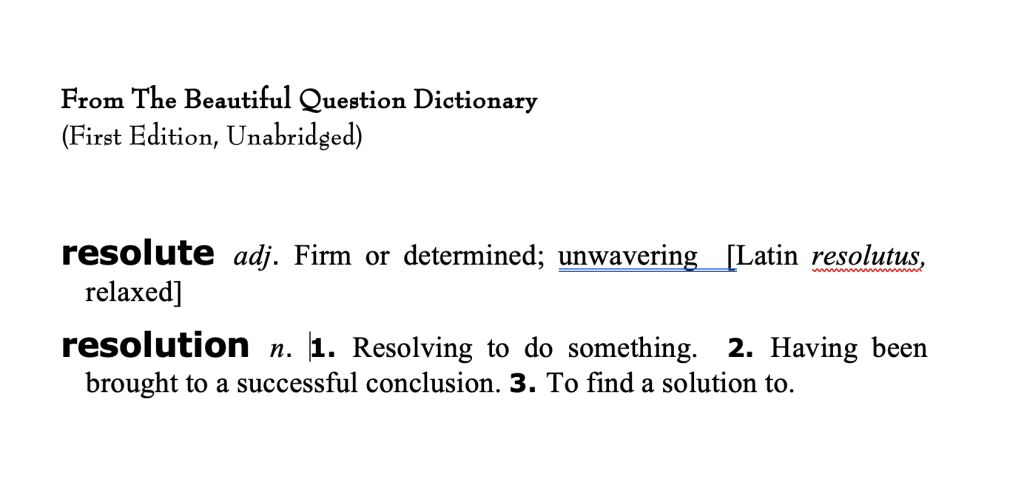Beyond Resolutions
[ theme music rises ]
(Lose the Net by Rasmus Faber Courtesy of Epidemic Music)
Isn’t it amazing that good questions lead us so naturally to good answers and that beautiful questions lead to even better answers! Each time we open ourselves to the things we don’t know, we’ve opened the doors to discovery and wonder and greater understanding.
I’m Scott Lennox and you’re listening to The Beautiful Question, a consideration of things that matter every day.
[ theme music & intro ]
I won’t waste time doing the math on the percentage of New Year’s resolutions are made and kept or the percentage of those that are made and not kept. Yet most of us are aware that the odds of resolutions being successfully carried out are so small that most people scoff at the thought of them and don’t take them seriously.
On the other hand, real and lasting changes are always possible when making them is based on being intentional and remaining deliberate about our choices. Join me this week as we consider ways of making changes that will take us where we really want to go. Stay with me.
[ brief pause ]
[ theme music fades ]
First, a brief look backwards.
The history of making New Year’s resolutions goes back at least four thousand years to the Babylonians. In efforts to gain favor from one year to the next, they made ritualistic promises and offerings to their gods.
Who can say how effective the outcomes were?
Similar practices were found among the ancient Romans after Julius Caesar established January first as the first month of the year. January is named for the Roman two-faced god, Janus, who is said to have looked into the past and the future at the same time. Like the practices of the Babylonians, the Romans offered sacrifices and made promises to Janus as the year began in the hope of swaying Janus to see things in their favor.
Again, the outcomes of their efforts can’t be measured.
Christians can trace the roots of New Year’s resolutions to the strict guidance of the English clergyman John Wesley. In the seventeen hundreds, it was Wesley who established a service of reverential contemplation at the turning of the year to replace the more, shall we say, “lively and libertine” celebrations that were common in his day as one year ended and a new one began. If nothing else, Wesley’s service was a time to consider better ways of moving forward.
[ brief pause ]
Earlier in my life, I remember several fruitless years in which I made New Year’s resolutions only to see my efforts quickly fade. As the time approached, I would tell myself, and sometimes only half-heartedly, “This year, I’m going to (fill in the blank),” or “This year, I’m going to stop (fill in the blank).”
And though I usually meant what I said at the time, and though my proposed changes sounded like good ones, and though the changes would have been good for me, there was little real intention behind them and no determination to bring them to fruition, so my resolutions never lasted.
With nothing to support them, how could they?

[ brief pause]
Reflecting on that has led me to ask several questions about the changes we choose to make and how to bring them into reality in lasting ways.
A bit of clarification might be useful.
For example, among the many definitions of “resolve” or “resolution,” we find the following phrases: “to reach a firm decision about,” and “to clear up or successfully deal with,” and “working to achieve a goal, even if it is difficult.”
Embedded within each of these definitions are simple cues that can guide our considerations. Principle among them is asking ourselves what we want strongly enough that we’re willing to do whatever is required without giving up or back away from the choices we make. Another is the matter of what we must do to be steadfast in our decision-making and steadfast in our follow-through.
[ brief pause ]
That leads us to this week’s three Beautiful Questions. If the outcome matters to you, take your time as you sit with them.
One: What change or changes, regardless how simple or complex, are the most important ones for you to make as this new year begins?
Two: What will help you remain focused enough to stay with the change or changes you’ve chosen to make?
Three: How will you know when you’ve reached your goal, and what will be different when you do?
[ brief pause ]
As the new year begins, may your considerations lead you to create meaningful changes in your life and a sense of mastery as you carry them out.
Happy New Year!
As I say each time,
My Light with Your Light!
[ theme music & sign-off ]
I’m happy we can engage this way as we consider things that matter and what to do about them. If nothing else, I hope you feel inspired to look more deeply at ways of caring for yourself.
You can be further inspired by visiting my friends at Kosmos Journal. That’s K O S M O S Journal. Their mission is to inform, inspire, and engage global transformation in harmony with all life. You can easily find them online at Kosmos Journal dot O R G.
And at thebeautifulquestion.com, you can read the illustrated transcript of each podcast as you listen. We’ve also included an archive of all previous podcasts, including guided relaxation audios that can help you practice letting go on a daily basis.
If you find these podcasts useful, I encourage you to share them and tell others about them. That’s a great way of helping me get a voice of calm and collaboration and balance and encouragement out into the world. It’s a great way of spreading peace.
[ brief pause ]
I’m Scott Lennox, and this has been The Beautiful Question.
[ brief pause ]
The Beautiful Question is a One Light production, written, produced, and engineered by Scott Lennox at HeartRock Studios in Fort Worth, Texas, as a way of paying forward to life, being fully present, becoming better engaged with things that truly matter in a complex world, and committing to a healthier future for all of us.
